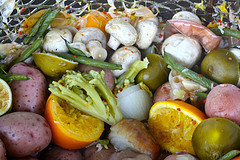How Local Is That "Locally Grown" Produce At Your Grocery Store?

(tjean314)
Last October, Walmart announced a pledge to double the amount of produce it purchases from local growers by 2015, with the three-pronged goal of saving on fuel costs, reducing spoilage and catering to a growing consumer appetite for local produce. But while Walmart defines “local” as grown and sold in the same state, your grocery store might have a different definition for the term.
The Wall Street Journal’s look at the world of local produce includes a sidebar that gives the definition of “local” produce at three major national grocery chains:
* Safeway (including Dominick’s, Genuardi’s, Von’s, Randall’s and others): Produce isn’t “local” if it requires more than an eight hours on the road to reach the store.
* Kroger (including Ralphs, Fred Meyer, Fry’s and others): Doesn’t put a strict definition on the term, saying it “can refer to produce grown in the same state or within the same region of the country.”
* Supervalu (including most Albertsons stores, Acme, Shaw’s Jewel-Osco and others): Though Supervalu tells the Journal that it buys between 25-40% of its produce locally, “local” can mean something different at each of the company’s subsidiary brands.
How much of a concern is buying local to you? Do you trust grocery stores when they say they are buying locally?
‘Local’ Grows on Wal-Mart [WSJ.com]
Want more consumer news? Visit our parent organization, Consumer Reports, for the latest on scams, recalls, and other consumer issues.

